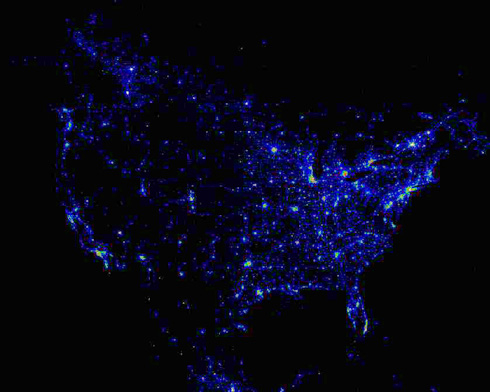Look to the stars in honor of Dark Sky Week
 (Download Image)
Photo courtesy of the U.S. Naval Observatory A weather satellite image of the United States at night.
(Download Image)
Photo courtesy of the U.S. Naval Observatory A weather satellite image of the United States at night.
If you turn your porch light off or dim it, you may be able to see more stars on a given night — even if you live in a highly populated area.
That's what astronomers and other scientists are asking during International Dark Sky Week, April 20-26.
International Dark Sky Week celebrates the heritage of the nighttime sky by encouraging people to turn out unnecessary lights on their property. It's also a good time to purchase shielded fixtures.
The event began in 2003 as National Dark-Sky Week in the United States and officially became international in 2007. The key to success is participation. The more people there are that turn out their lights, the less light pollution there will be.
At one time, most telescopes were in remote areas. But those observatories are less and less remote and light pollution now has a big effect on the ability to see faraway stars, according to Kem Cook, one of the Lab's few optical astronomers.
The four components of light pollution are often combined and may overlap:
- Urban Sky Glow — the brightening of the night sky over inhabited areas.
- Light Trespass — light falling where it is not intended, wanted, or needed.
- Glare — excessive brightness which causes visual discomfort. High levels of glare can decrease visibility.
- Clutter — bright, confusing, and excessive groupings of light sources, commonly found in over-lit urban areas. The proliferation of clutter contributes to urban sky glow, trespass and glare.
Increased urban sky glow is responsible for the disappearance of the Milky Way from night skies. For professional astronomers the increasing distance to prime observing sites, well away from sources of air pollution and urban sky glow, becomes more problematic as economic and environmental energy costs skyrocket.
"It's very important for optical astronomy," Cook said. "At most observatories, there is a lot of light from nearby cities. It makes it hard to see faint stars."
Cook uses spectroscopy, which spreads light into a spectrum. However, the spectra is negatively influenced by high pressure mercury lighting, the white street lights found in many neighborhoods. If those lights are replaced with low pressure sodium lights, like what has been done in some neighborhoods in Tucson near the Kitt Peak National Observatory, stargazing becomes easier, according to Cook.
"The proper shielding is as important as the type of light," Cook said. "Proper baffling reflects the light and makes it more efficient because you use less power."
But light pollution is not limited to astronomy. Research suggests that light at night may interfere with normal circadian rhythms — the 24-hour cycle of day and night that humans have used to maintain health and regulate their activities for thousands of years. Light trespass, occurring when streetlights or a neighbor's security light directs unwanted lighting onto property or into homes, contributes to a loss of natural darkness.
Wildlife also can be harmed by the unnecessary brightening of the night. From newly hatched sea turtles to migrating birds, fish, frogs, salamanders and lightning bugs, artificial night lighting disrupts the cycles of nocturnal creatures.
According to the International Dark-Sky Association:
- Billions of dollars are spent on unnecessary lighting every year in the United States alone, with an estimated $1.7 billion going directly into the nighttime sky via unshielded outdoor lights.
- Wasted lighting in the United States releases 38 million tons of carbon dioxide into the atmosphere annually; unshielded outdoor lights are directly responsible for 1.2 million tons of carbon dioxide waste.
To celebrate Dark Sky Week, here are some suggestions from Dark Skies Awareness:
- Turn out your outdoor lights during the week if possible.
- Encourage friends and neighbors to do the same.
- Many people must participate.
- Find out if there are any star parties or events at a local observatory during the week.
- Do not turn off lights that are necessary for public safety such as busy parking lots or busy walkways.
- When stargazing, carry a red-tinted flashlight so that you can see where you are going without losing your night vision.
- Go in groups when stargazing in a dark area.
The first night of IDSW will coincide with the Starlight Initiative's "World Night in Defense of Starlight." All over the world, the night of Monday, April 20, is dedicated to the appreciation of starlight and the promotion activities that showcase the spectacle of the universe at night.




